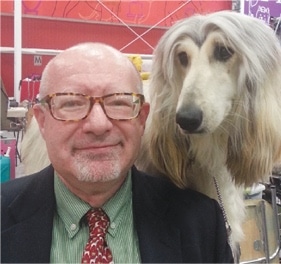
Home » Managing Trust Issues

Because we love our dogs, our breed, our clubs, and our sport, one of the most difficult things we have to learn is how to manage our trust issues. We all try to be protective, but it’s easy to slide into micro-managing our peers and protégés. It’s especially difficult to curb those controlling tendencies if we ourselves have been hurt in the past by someone we trusted. We all know breeders who are respected for the quality of dogs they produce but at the same time are difficult to engage with. Here are some familiar scenarios where trust can help to forge strong friendships while advancing our breed.
While we know instinctively that new blood will benefit our breed, sometimes newcomers still get the cold shoulder through no fault of their own. In the case of experienced dog people who have been successful in other breeds, their only liability seems to be in not having owned one of our breed. Those who are both new to our breed and to dog showing may be scared away by overly zealous gatekeepers who have come to believe that the grooming of our breed can only be mastered by a small handful of exhibitors. Yet these newcomers are often well-educated professionals who purchased their previous companion dogs from established breeders, then started attending dog shows and did enough research to find you. Is it any wonder, after getting rebuffed by a few well-known breeders, that both the experienced dog people and the novices would appreciate the warm welcome they receive from foreign breeders and decide to import their show prospect?
Even our most prestigious breeders were novices themselves once, who were guided and encouraged by generous mentors. Now it’s our turn to pay it forward. The list of low-entry breeds grows yearly at an alarming rate, and so it behooves each of us to welcome anyone who inquires about our breed. It’s easy to keep breed information sheets on our computer and email them to prospective owners. You may not have a litter on the ground, but new people will appreciate meeting an active breeder and adult dogs, in person if distance allows. Who knows? That first brief email you receive may lead to regular communication, a budding friendship, and perhaps a new home and co-owner for an adult dog that you haven’t had the time to bring out yet.
You may have decided not to breed your bitch on her upcoming season, only to have another breeder ask to use your stud dog. Depending upon your breed’s popularity you may or may not know the bitch’s owner personally. But if the bitch looks to be a worthy representative, and has passed appropriate health testing, begin a conversation. At the very least, you will come across as a friendly breeder-exhibitor. Have they been in the breed long, and do they have homes lined up? If you don’t feel the two dogs are compatible in pedigree, explain those nuances to the owner. It’s kinder than a flat-out rejection. If a stud dog you know might be a better fit for her, make that suggestion. It shows that you care about the welfare and improvement of your breed, beyond your personal breeding program.
Many new people in the sport refrain from joining dog clubs. Often they assume that clubs will feel like a clique, but the reputation for clubs being unfriendly is sometimes warranted. Long-time club members holding office can feel proprietary when new people arrive and express interest in volunteering. If that is a problem in your club, the membership chair and the president must step up and run interference.
Like all of us, new members are short on free time, and if they sense the old guard is aloof and indifferent to them, they’ll soon lose interest. Be sure to introduce guests and new members at the first meeting they attend; and ask them to share their professional background, as well as their interests within the sport. Then listen carefully. High-tech people, PR professionals, chefs and caterers? Clubs can certainly make use of all those skills. Connect those folks with members who chair the right committees, and start building those bridges. It is absolutely a win-win. Our sport needs enthusiastic newcomers of all ages to thrive. If someone reaches out to you, take the leap of faith, offer a warm welcome, and add a few new people to that proverbial “village” that it takes to keep things flowing smoothly.
